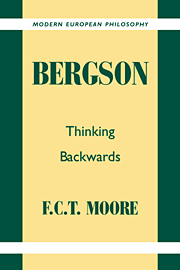Book contents
- Frontmatter
- Contents
- Abbreviations
- Preface
- Introduction
- 1 The Requirement of Precision
- 2 Philosophy and Knowledge: Uses and Misuses of ‘Representation’
- 3 Durance: Unfolding in Time
- 4 Laughter
- 5 Tension
- 6 Aporetic Philosophy
- 7 Branching
- 8 Going Beyond
- 9 Magic and the Primitive: The Antinomies of Pure Intelligence
- 10 Paradoxical Epilogue: Reason Ruefully Repressed
- Works Cited
- Index of Names
- Index of Subjects
1 - The Requirement of Precision
Published online by Cambridge University Press: 05 June 2012
- Frontmatter
- Contents
- Abbreviations
- Preface
- Introduction
- 1 The Requirement of Precision
- 2 Philosophy and Knowledge: Uses and Misuses of ‘Representation’
- 3 Durance: Unfolding in Time
- 4 Laughter
- 5 Tension
- 6 Aporetic Philosophy
- 7 Branching
- 8 Going Beyond
- 9 Magic and the Primitive: The Antinomies of Pure Intelligence
- 10 Paradoxical Epilogue: Reason Ruefully Repressed
- Works Cited
- Index of Names
- Index of Subjects
Summary
Bergson wrote, at the end of his career: ‘Precision is what has been most lacking in philosophy.’ Yet there are other philosophers who have attacked his work for its alleged lack of precision. How can this be?
What is precision? I shall offer a sketch of Descartes's views on this, which have had a great influence, not always sufficiently attended to. We shall see how Bergson's views contrast sharply with the Cartesian approach.
A main objective of Descartes was to establish a method which would be precise and rigorous. But his view of precision has two features: first, it is formal, in the sense that it is independent of subject-matter. Descartes himself made it clear that he was concerned to lay out the method for reason to follow in any domain. Second, it is analytic, in the sense that it attempts an account of any fact, phenomenon or problem by resolving it into its simpler parts. With this conception of precision, we should in principle be able to determine the degree of precision of any account of anything without concerning ourselves with the subject-matter. Precision would become a matter of pure methodology: a style of thought.
But this Cartesian notion of precision is open to question. Take a finger. A simplistic anatomical account of the finger could certainly be precise, in the formal sense, if it listed the components of a finger and described the way in which they were put together.
- Type
- Chapter
- Information
- BergsonThinking Backwards, pp. 14 - 17Publisher: Cambridge University PressPrint publication year: 1996

